The African Development Bank (AfDB) signs a new agreement with the South Korean government. Seoul will invest $600 million in renewable energy through its financial arm, the Korea Eximbank.
South Korea will invest $600 million in Africa’s vibrant renewable energy sector. Seoul will make its investments alongside the African Development Bank (AfDB), one of the most active financial institutions in the sector. An agreement was recently signed between the pan-African bank, the South Korean Ministry of Economy and Finance and the Korea Eximbank.
South Korea is providing this new financing under the KAEIF (Korea-Africa Energy Investment Framework) pact, signed with the AfDB on May 28th, 2021. This partnership is particularly focused on renewable energy. “KAEIF is a testimony to the close cooperation between the AfDB and the Republic of Korea for the development of the energy sector in Africa. KAEIF will provide much-needed additional funding, in addition to AfDB financing, to support accelerated access to electricity and the continent’s equitable transition to clean energy,” says Kevin Kariuki, AfDB Vice President for Power, Energy, Climate and Green Growth.
Read also- NIGERIA: South Korea supports Suleja’s green smart city project
The funds allocated by Seoul through the Korea Eximbank will be invested in the production, transmission and distribution of renewable energy. The KAEIF pact will also support the deployment of off-grid solutions, including mini-grids and solar home systems that accelerate rural electrification in Africa. The AfDB has put in place mechanisms dedicated to financing off-grid solutions in Africa. This is the case of the Energy Inclusion Facility (EIF) set up by the financial institution for grid projects and decentralized solutions.
The facility is also funded by the Global Environment Facility (GEF), the Kreditanstalt für Wiederaufbau (KfW), the German development agency, the Nordic Development Fund (NDF), Calvert Impact Capital and the Prudential Insurance Company of America. Korea’s financing should also accompany the sustainable post-Covid-19 economic recovery. In this context, the South Korean government has given priority to the Green New Deal.
Jean Marie Takouleu







